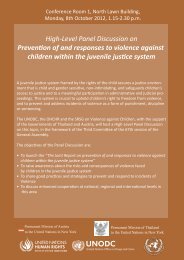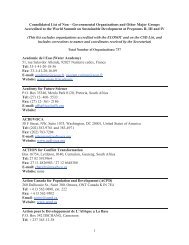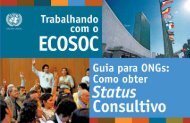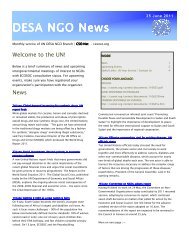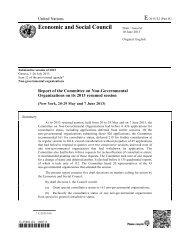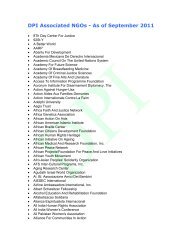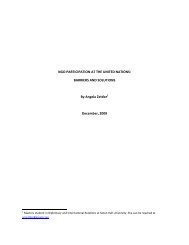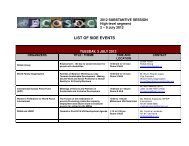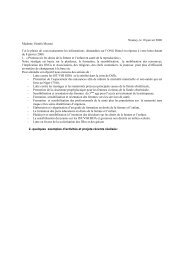Consultative Status - UN DESA NGO Branch
Consultative Status - UN DESA NGO Branch
Consultative Status - UN DESA NGO Branch
Create successful ePaper yourself
Turn your PDF publications into a flip-book with our unique Google optimized e-Paper software.
<strong>UN</strong>ITED NATIONS<br />
Working<br />
with<br />
an <strong>NGO</strong>s Guide to<br />
<strong>Consultative</strong><br />
<strong>Status</strong>
Working<br />
with<br />
an <strong>NGO</strong>s Guide to<br />
<strong>Consultative</strong><br />
<strong>Status</strong><br />
United Nations<br />
New York, 2011
Table of contents<br />
The United Nations and <strong>NGO</strong>s. ............... 1<br />
ECOSOC and its subsidiary bodies. ............ 3<br />
ECOSOC consultative status. ................ 6<br />
<strong>UN</strong> grounds pass. ....................... 8<br />
Events participation. .....................11<br />
Commission on Sustainable Development. ...11<br />
Commission on the <strong>Status</strong> of Women. ......12<br />
Commission for Social Development. .......12<br />
Permanent Forum on Indigenous Issues. ....13<br />
Commission on Population and Development.. 13<br />
United Nations Forum on Forests. .........14<br />
Commission on Crime Prevention<br />
and Criminal Justice. .................14<br />
Commission on Narcotic Drugs ...........15<br />
Commission on Science and<br />
Technology for Development. ............15<br />
Statistical Commission. ................16<br />
Human Rights Council. ....................17<br />
Written statements ......................19<br />
Oral statements. ........................22<br />
Organize your own event at the United Nations ...24<br />
The application process. ...................26<br />
1. Creating a profile for your <strong>NGO</strong> ..........27<br />
2. Submitting your online application .......29<br />
3. Screening your application. ............32<br />
4. Review of your application by the<br />
Committee on <strong>NGO</strong>s. ................ 33<br />
5. The Committee makes a recommendation ...34<br />
6. Final decision by ECOSOC. .............36<br />
Quadrennial reports. .....................38<br />
Contact information and useful links. ..........41<br />
iii
The United Nations<br />
and <strong>NGO</strong>s<br />
Non-governmental organizations (<strong>NGO</strong>s) have<br />
been actively engaged with the United Nations (<strong>UN</strong>)<br />
since its inception in 1945. They work with the United<br />
Nations Secretariat, programmes, funds and agencies<br />
in various ways, including in consultation with Member<br />
States. <strong>NGO</strong>s contribute to a number of activities<br />
including information dissemination, awareness raising,<br />
development education, policy advocacy, joint<br />
operational projects, participation in intergovernmental<br />
processes and in the contribution of services and<br />
technical expertise.<br />
Article 71 of the United Nations Charter,<br />
which established the Economic and Social Council<br />
(ECOSOC), states the following:<br />
The Economic and Social Council may make suitable<br />
arrangements for consultation with nongovernmental<br />
organizations which are concerned<br />
with matters within its competence. Such<br />
arrangements may be made with international<br />
organizations and, where appropriate, with<br />
national organizations after consultation with<br />
the Member of the United Nations concerned.<br />
— United Nations Charter,<br />
Chapter X, Article 71<br />
Article 71 of the <strong>UN</strong> Charter opened the door<br />
to provide suitable arrangements for consultation<br />
with non-governmental organizations. The consultative<br />
relationship with ECOSOC is governed today by<br />
ECOSOC resolution 1996/31, which outlines the eligibility<br />
requirements for consultative status, rights and<br />
obligations of <strong>NGO</strong>s in consultative status, procedures<br />
for the withdrawal or suspension of consultative status,<br />
the role and functions of the ECOSOC Committee on<br />
<strong>NGO</strong>s, and the responsibilities of the <strong>UN</strong> Secretariat in<br />
supporting the consultative relationship.<br />
1
The United Nations has been working to strengthen<br />
cooperation with <strong>NGO</strong>s across the entire United Nations<br />
system and in all areas of its work. As a result, United<br />
Nations entities are identifying new modalities to promote<br />
increased and more strategic participation of <strong>NGO</strong>s.<br />
Thh e necessity of strengthening <strong>UN</strong>/<strong>NGO</strong>s relations<br />
has been underlined in various documents, in particular<br />
in the Millennium Declaration in September 2000.<br />
The commitment of Member States to provide greater<br />
opportunity to <strong>NGO</strong>s was reaffirmed in the 2005 World<br />
Summit Outcome Document.<br />
From the beginning, the Economic and Social<br />
Council (ECOSOC) has been the main entry point<br />
into the <strong>UN</strong> system for <strong>NGO</strong>s. ECOSOC remains the<br />
only main <strong>UN</strong> body with a formal framework for <strong>NGO</strong><br />
participation. In 1946, 41 <strong>NGO</strong>s were granted consultative<br />
status by the council; by 1992 more than 700 <strong>NGO</strong>s<br />
had attained consultative status and the number has<br />
been steadily increasing ever since to more than 3,400<br />
organizations today.<br />
2 2
ECOSOC and its<br />
subsidiary bodies<br />
The Economic and Social Council is the principal<br />
organ that coordinates the economic, social and related<br />
work of the 14 United Nations specialized agencies,<br />
functional commissions and five regional commissions.<br />
It serves as the central forum for discussing international<br />
economic and social issues, and for formulating<br />
policy recommendations addressed to Member States<br />
and the United Nations system.<br />
ECOSOC consists of 54 Member States elected by<br />
the General Assembly for overlapping three-year terms.<br />
Seats on the Council are allotted based on geographical<br />
representation with 14 allocated to African States, 11 to<br />
Asian States, 6 to Eastern European States, 10 to Latin<br />
American and Caribbean States, and 13 to Western<br />
European and other States.<br />
The work of the Council is conducted through<br />
several sessions and preparatory meetings, round tables<br />
and panel discussions with members of civil society<br />
throughout the year. Once a year, it meets for a fourweek<br />
substantive session in July, alternating between<br />
New York and Geneva. The annual session is organized<br />
in five segments and include: (i) the High-level segment;<br />
(ii) the Coordination segment; (iii) the Operational<br />
Activities segment; (iv) the Humanitarian Affairs<br />
segment; and (v) the General segment.<br />
The Annual Ministerial Review (AMR), launched<br />
in 2007 and held during the annual High-level segment<br />
of ECOSOC, assesses progress made towards the<br />
United Nations Development Agenda (<strong>UN</strong>DA). It also<br />
serves as a global high-level forum with broad-based<br />
participation to exchange lessons learned and highlight<br />
successful practices.<br />
The Development Cooperation Forum (DCF),<br />
also launched in 2007, is mandated to enhance the<br />
3
implementation of the internationally agreed development<br />
goals and promote dialogue to find effective ways<br />
to support it. It is the focal point within the United<br />
Nations system and a principal forum for global dialogue<br />
and policy review on the effectiveness and coherence<br />
of international development cooperation. The<br />
DCF is held every other year within the framework of<br />
the High-level segment of the Council.<br />
There are a number of subsidiary bodies under the<br />
ECOSOC umbrella which help to achieve the goals of<br />
the Council. ECOSOC provides policy coherence and<br />
coordinates the overlapping functions of all its subsidiary<br />
bodies. Once <strong>NGO</strong>s gain consultative status, they<br />
can actively participate in the work of ECOSOC subsidiary<br />
bodies.<br />
ECOSOC functional commissions<br />
»»<br />
Statistical Commission<br />
»»<br />
Commission on Population and Development<br />
»»<br />
Commission for Social Development<br />
»»<br />
Commission on the <strong>Status</strong> of Women<br />
»»<br />
Commission on Narcotic Drugs<br />
»»<br />
Commission on Crime Prevention and Criminal Justice<br />
»»<br />
Commission on Science and Technology for<br />
Development<br />
»»<br />
Commission on Sustainable Development<br />
ECOSOC regional commissions<br />
»»<br />
Economic Commission for Africa (ECA)<br />
»»<br />
Economic and Social Commission for Asia and the<br />
Pacific (ESCAP)<br />
»»<br />
Economic Commission for Europe (ECE)<br />
»»<br />
Economic Commission for Latin America and the<br />
Caribbean (ECLAC)<br />
»»<br />
Economic and Social Commission for Western Asia<br />
(ESCWA)<br />
Other bodies<br />
»»<br />
Permanent Forum on Indigenous Issues<br />
»»<br />
United Nations Forum on Forests<br />
»»<br />
Sessional and standing committees<br />
»»<br />
Expert, ad hoc and related bodies<br />
4
ECOSOC<br />
consultative status<br />
ECOSOC remains the only main <strong>UN</strong> body with a<br />
formal framework for <strong>NGO</strong> participation.<br />
This accreditation framework benefits both the<br />
United Nations and the <strong>NGO</strong>s. As stated by resolution<br />
1996/31 on the “<strong>Consultative</strong> relationship between the<br />
United Nations and non-governmental organizations,”<br />
“... <strong>Consultative</strong> arrangements are to be made,<br />
on the one hand, for the purpose of enabling<br />
the Council or one of its bodies to secure expert<br />
information or advice from organizations having<br />
special competence in the subjects for which<br />
consultative arrangements are made, and, on the<br />
other hand, to enable international, regional,<br />
sub-regional and national organizations that<br />
represent important elements of public opinion<br />
to express their views.”<br />
— ECOSOC resolution 1996/31,<br />
part II, paragraph 20<br />
6
While ECOSOC has the opportunity to avail<br />
itself of valuable and expert advice from <strong>NGO</strong>s, the<br />
<strong>NGO</strong>s in turn also have the opportunity of expressing<br />
their views and influencing the work of the Council.<br />
<strong>NGO</strong>s have specialized competence, hands-on experience<br />
and flexibility that is of great value to the <strong>UN</strong>.<br />
For instance, by having consultative status, an <strong>NGO</strong><br />
could:<br />
»»<br />
Provide expert analysis on issues directly from its<br />
experience in the field;<br />
»»<br />
Serve as an early warning agent;<br />
»»<br />
Help monitor and implement international<br />
agreements;<br />
»»<br />
Help raise public awareness of relevant issues;<br />
»»<br />
Play a major role in advancing United Nations goals<br />
and objectives;<br />
»»<br />
Contribute with essential information at organization<br />
events.<br />
On the other hand, ECOSOC provides <strong>NGO</strong>s the<br />
opportunity to be heard by a truly global audience and<br />
contribute to its agenda. An <strong>NGO</strong> with consultative<br />
status can:<br />
»»<br />
Attend international conferences and events;<br />
»»<br />
Make written and oral statements at these events;<br />
»»<br />
Organize side events;<br />
»»<br />
Enter United Nations premises;<br />
»»<br />
Have opportunities to network and lobby.<br />
Please note that ECOSOC does not provide funding<br />
or financial support of any kind to any organization<br />
with which it partners. However, social networking at<br />
ECOSOC events allows organizations to expand their<br />
contacts and knowledge base to explore possible partnerships<br />
and joint ventures with various stakeholders.<br />
7
United Nations<br />
grounds pass<br />
Each <strong>NGO</strong> in consultative status with ECOSOC<br />
can designate representatives to obtain annual passes<br />
granting them access to <strong>UN</strong> premises, which are valid<br />
until 31 December of each year. A maximum of five<br />
such passes for each <strong>NGO</strong> can be issued for New York,<br />
five for Geneva and five for Vienna, in addition to passes<br />
for the Chief Administrative Officer (CAO) and the<br />
President or Chief Executive of each <strong>NGO</strong>, for a total of<br />
seven passes. Short-term passes for one day and/or for<br />
up to three months are also available for specific events.<br />
To apply for an annual pass to the <strong>UN</strong> Headquarters<br />
in New York, the following steps need to be followed:<br />
»»<br />
First, log in to your organization’s page (at the <strong>NGO</strong><br />
<strong>Branch</strong> 1 home page [see Contact information and<br />
useful links]<br />
1 The <strong>NGO</strong> <strong>Branch</strong> is part of the Department of Social and<br />
Economic Affairs of the <strong>UN</strong> Secretariat in New York<br />
»»<br />
Under the “<strong>Consultative</strong> status” tab, go to “Designations”<br />
»»<br />
Click on “New York” to pre-register the representatives<br />
you wish to designate.<br />
Once you have pre-registered, each of your representatives<br />
can collect his/her grounds pass at the <strong>NGO</strong><br />
<strong>Branch</strong> office (see under Contacts) with a picture ID and<br />
a signed letter on the official letterhead of the organization<br />
from your Chief Executive/President, designating<br />
a maximum of five representatives for annual passes<br />
(plus two more for the CAO and Chief Executive). Any<br />
passes that you no longer use must be returned.<br />
<strong>NGO</strong>s must also notify the <strong>NGO</strong> <strong>Branch</strong> when<br />
any one of their designated representatives is<br />
no longer employed by the organization so that<br />
an updated list of official representatives can<br />
always be maintained and new passes can be<br />
issued, as needed.<br />
8
Events<br />
participation<br />
<strong>NGO</strong>s that are accredited with ECOSOC can<br />
participate in a number of events, including, but not<br />
limited to, the regular sessions of ECOSOC, its func-<br />
tional commissions and its other subsidiary bodies. At<br />
these sessions, which usually take place once a year,<br />
<strong>NGO</strong>s may:<br />
»»<br />
Attend official meetings;<br />
»»<br />
Submit written statements prior to sessions;<br />
»»<br />
Make oral statements;<br />
»»<br />
Meet official government delegations and other <strong>NGO</strong><br />
representatives;<br />
»»<br />
Organize and attend parallel events that take place<br />
during the session;<br />
»»<br />
Participate in debates, interactive dialogues, panel<br />
discussions and informal meetings.<br />
Different bodies have different modalities for <strong>NGO</strong><br />
participation, but common to all of them is that only<br />
<strong>NGO</strong>s that are accredited to and in good standing with<br />
ECOSOC are allowed to participate in their sessions.<br />
Commission on<br />
Sustainable Development<br />
The Commission on Sustainable Development (CSD)<br />
was created in December 1992 to ensure effective<br />
follow-up of the 1992 United Nations Conference on<br />
Environment and Development<br />
(<strong>UN</strong>CED — also known<br />
as the Earth Summit), in Rio<br />
de Janeiro, Brazil, where world<br />
leaders signed the Framework<br />
Convention on Climate Change<br />
11
and the Convention on Biological Diversity; endorsed<br />
the Rio Declaration and the Forest Principles; and<br />
adopted Agenda 21, a 300-page plan for achieving sustainable<br />
development in the twenty-first century.<br />
The CSD meets annually (end of April — beginning<br />
of May) in New York, in two-year cycles, with<br />
each cycle focusing on clusters of specific thematic and<br />
cross-sectoral issues. The CSD encourages broad <strong>NGO</strong><br />
participation.<br />
Commission on<br />
the <strong>Status</strong> of Women<br />
The Commission on the <strong>Status</strong> of Women (CSW) is<br />
the principal global policymaking<br />
body dedicated to gender equality<br />
and advancement of women. The<br />
Commission meets annually for<br />
a period of 10 working days (late<br />
February — early March) in New<br />
York to evaluate progress on gender equality, identify<br />
challenges, set global standards and formulate concrete<br />
policies to promote gender equality and advancement<br />
of women worldwide.<br />
The active participation of <strong>NGO</strong>s is a critical element<br />
in the work of the CSW. <strong>NGO</strong>s have been influential<br />
in shaping the current global policy framework<br />
on women’s empowerment and gender equality — the<br />
Beijing Declaration and Platform for Action. They continue<br />
to play an important role in holding international<br />
and national leaders accountable for the commitments<br />
they made in the Platform for Action.<br />
Commission for<br />
Social Development<br />
Since the convening of the World<br />
Summit for Social Development in<br />
Copenhagen in 1995, the Commission<br />
for Social Development (CSocD)<br />
12
has been the key <strong>UN</strong> body in charge of the follow-up<br />
and implementation of the Copenhagen Declaration<br />
and Programme of Action. It meets once a year in<br />
New York, usually in February. Each year since 1995,<br />
the Commission has taken up key social development<br />
themes as part of its follow-up to the outcome of the<br />
Copenhagen Summit. The work is organized in a series<br />
of two-year cycles, which include a review and a policy<br />
segment.<br />
Permanent Forum<br />
on Indigenous Issues<br />
The <strong>UN</strong> Permanent Forum on Indigenous Issues<br />
(<strong>UN</strong>PFII) is an advisory body to<br />
ECOSOC, with a mandate to discuss<br />
indigenous issues related to<br />
economic and social development,<br />
culture, the environment, education,<br />
health and human rights.<br />
It meets for 10 days each year, usually in May, in<br />
New York. Each session has thematically focused on<br />
a specific issue. For example, the theme of the ninth<br />
session in 2010 was “Indigenous peoples: development<br />
with culture and identity; articles 3 and 32 of the<br />
United Nations Declaration on the Rights of Indigenous<br />
Peoples”.<br />
Commission on<br />
Population and Development<br />
The Commission on Population and Development<br />
(CPD) assists and advises ECOSOC on population<br />
issues and trends, population and development strategies,<br />
policies and programmes, and provides population<br />
assistance to developing countries.<br />
The CPD used to meet every two or three years<br />
until 1994, after which it began to meet once a year,<br />
usually in the beginning of April. Each session is dedicated<br />
to a certain theme, with the most recent session in<br />
13
2011 focusing on the theme of “Fertility, reproductive<br />
health and development”.<br />
United Nations<br />
Forum on Forests<br />
The United Nations Forum on Forests (<strong>UN</strong>FF) has as<br />
its main objective the promotion of the management,<br />
conservation and sustainable development<br />
of all types of forests and to<br />
strengthen long-term political commitment<br />
to this end.<br />
Since 2007, the Forum has<br />
been organized in two-year cycles<br />
for up to two weeks. Each session of the Forum is based<br />
on its central theme.<br />
Commission on Crime Prevention<br />
and Criminal Justice<br />
The Commission on Crime Prevention and Criminal<br />
Justice (CCPCJ) is the central body within the United<br />
Nations system providing policy guidance on crime<br />
prevention and criminal justice. The Commission formulates<br />
international policies and recommendations<br />
on criminal justice issues, including trafficking in<br />
persons, transnational crime and aspects of terrorism<br />
prevention.<br />
Its mandated priority areas are:<br />
»»<br />
International action to combat national and transnational<br />
crime, including organized crime, economic<br />
crime and money laundering;<br />
»»<br />
Promoting the role of criminal law in protecting the<br />
environment;<br />
»»<br />
Crime prevention in urban areas, including juvenile<br />
crime and violence;<br />
»»<br />
Improving the efficiency and fairness of criminal<br />
justice administration systems.<br />
14
Aspects of these principal themes are selected for<br />
discussion at each annual session held around April/<br />
May in Vienna.<br />
Commission on<br />
Narcotic Drugs<br />
Established in 1946, the Commission on Narcotic<br />
Drugs (CND) is the central policymaking body of the<br />
United Nations in drug-related matters. The Commission<br />
analyses the world drug situation and develops<br />
proposals to strengthen the international drug control<br />
system to combat the drug problem worldwide.<br />
It assists ECOSOC in supervising the application<br />
of international conventions and agreements dealing<br />
with narcotic drugs. It also advises the Council on all<br />
matters pertaining to the control of narcotic drugs and<br />
psychotropic substances and their precursors.<br />
The Commission meets annually in Geneva for a<br />
period not exceeding eight working days, usually in March.<br />
Commission on Science and<br />
Technology for Development<br />
The Commission on Science and Technology for Development<br />
(CSTD), established in 1992 to advise the General<br />
Assembly and the Economic and Social Council,<br />
acts as a forum for:<br />
»»<br />
The examination of science and technology questions<br />
and their implications for development;<br />
»»<br />
The advancement of understanding on science and<br />
technology policies, particularly with respect to<br />
developing countries;<br />
»»<br />
The formulation of recommendations and guidelines<br />
on science and technology matters within the United<br />
Nations system.<br />
The Commission meets annually for a period of<br />
one week in Geneva in May.<br />
15
Statistical<br />
Commission<br />
The United Nations Statistical Commission (<strong>UN</strong><br />
StatCom), established in 1947, assists ECOSOC in:<br />
»»<br />
Promoting the development of national statistics and<br />
the improvement of their comparability;<br />
»»<br />
The coordination of the statistical work of specialized<br />
agencies;<br />
»»<br />
The development of the central statistical services of<br />
the <strong>UN</strong> Secretariat;<br />
»»<br />
Advising the organs of the United Nations on general<br />
questions relating to the collection, analysis and<br />
dissemination of statistical information;<br />
»»<br />
Promoting the improvement of statistics and statistical<br />
methods generally.<br />
The Commission meets annually in New York for<br />
four days, at the end of February.<br />
16
Human Rights<br />
Council<br />
The Human Rights Council (HRC) is the principal<br />
United Nations intergovernmental body responsible for<br />
human rights. It is composed of<br />
47 Member States, and meets for<br />
at least three sessions each year in<br />
Geneva, Switzerland.<br />
Its role includes addressing<br />
violations of human rights,<br />
including gross and systematic<br />
violations, the promotion of<br />
respect for human rights for all, and effective coordination<br />
and mainstreaming of human rights within the <strong>UN</strong><br />
system.<br />
During a given session (regular sessions) the<br />
Council considers the activities of its subsidiary human<br />
rights procedures and mechanisms, and may organize<br />
17
panel discussions and special events to enhance dialogue<br />
and mutual understanding on specific issues.<br />
Outside its normal sessions, the Council may also<br />
hold special sessions related to country-specific or thematic<br />
issues.<br />
Even though this body is not subsidiary of<br />
ECOSOC, only <strong>NGO</strong>s in consultative status with the<br />
United Nations Economic and Social Council can be<br />
accredited to participate in the Human Rights Council’s<br />
sessions as observers.<br />
As observers, <strong>NGO</strong>s are able, among other things, to:<br />
»»<br />
Attend and observe all proceedings of the Council with<br />
the exception of the Council deliberations under the<br />
Complaints Procedure;<br />
»»<br />
Submit written statements to the Human Rights<br />
Council;<br />
»»<br />
Make oral interventions to the Human Rights Council;<br />
»»<br />
Participate in the Universal Periodic Review (UPR) which<br />
involves a review of the human rights records of all 192<br />
United Nations Member States once every four years;<br />
»»<br />
Participate in debates, interactive dialogues, panel<br />
discussions and informal meetings;<br />
»»<br />
Organize “parallel events” on issues relevant to the<br />
work of the Human Rights Council.<br />
An <strong>NGO</strong> in consultative status with ECOSOC that<br />
wishes to attend a session of the Human Rights Council<br />
must send a letter of request for accreditation to its Secretariat<br />
in Geneva, well in advance of the relevant session.<br />
The web page of the Human Rights Council provides<br />
extensive information on <strong>NGO</strong> participation.<br />
“One cannot overestimate the contribution that<br />
civil society has made towards the development<br />
of international human rights standards. […]<br />
Today, civil society’s views, practical knowledge<br />
and scholarship are as crucial to the human<br />
rights movement as ever in the pursuit of justice<br />
and equality for all.”<br />
— Navanethem Pillay,<br />
United Nations High Commissioner for<br />
Human Rights (2008).<br />
18
Written<br />
statements<br />
ECOSOC needs and wants expert opinions, ideas<br />
and suggestions from civil society. For this reason <strong>NGO</strong>s<br />
are often encouraged to submit written statements to<br />
address subjects under the different areas of work of the<br />
Council. Resolution 1996/31 states the following about<br />
written statements:<br />
“Written statements relevant to the work of<br />
the Council may be submitted by organizations<br />
in general consultative status and special<br />
consultative status on subjects in which these<br />
organizations have a special competence. Such<br />
statements shall be circulated by the Secretary-<br />
General of the United Nations to the members<br />
of the Council ...”<br />
— ECOSOC resolution 1996/31,<br />
part IV, paragraph 30<br />
Written statements can be submitted online at the<br />
CSONet website (see under Contacts). Please be sure<br />
to read the information very carefully before drafting<br />
and submitting the statements since some events may<br />
require different procedures for written statements.<br />
For written statements to ECOSOC, the number<br />
of words for submission depends on the type of consultative<br />
status the <strong>NGO</strong> has. According to resolution<br />
1996/31, the word count for statements is limited to the<br />
following:<br />
»»<br />
For those in general consultative status: a maximum<br />
of 2,000 words<br />
»»<br />
For those in special consultative status: a maximum<br />
of 500 words<br />
Only one written statement is allowed for each<br />
organization.<br />
19
Organizations with roster consultative status may<br />
only submit a written statement if invited to do so by<br />
the Secretary-General, in consultation with the President<br />
of ECOSOC or its Committee on <strong>NGO</strong>s.<br />
Written statements by <strong>NGO</strong>s with general or<br />
special consultative status can also be submitted to<br />
ECOSOC commissions and subsidiary bodies, including<br />
the functional committees, on subjects in which the<br />
<strong>NGO</strong>s have specialized knowledge. The word count for<br />
statements is limited to the following:<br />
»»<br />
General consultative status: a maximum of 2,000<br />
words<br />
»»<br />
Special consultative status: a maximum of 1,500<br />
words<br />
Only one written statement is allowed for each<br />
organization.<br />
Please refer to resolution 1996/31 for more information.<br />
A list of the functional committees with contact<br />
information is provided in the Contacts section.<br />
<strong>NGO</strong>s may also consider submitting joint statements<br />
with other organizations. This can be done at the<br />
bottom of the statement submission page under Joint<br />
Submission. You can search for the organization you<br />
want to partner with and select them before submitting<br />
the statement.<br />
20
Oral<br />
statements<br />
As stated in resolution 1996/31, organizations with<br />
general or special consultative status have the option of<br />
presenting an oral statement at the ECOSOC annual<br />
meeting either at the United Nations in New York or the<br />
United Nations Office in Geneva, depending on where<br />
it is held in a particular year. The Council’s annual<br />
meetings alternate between these two cities. Only one<br />
oral statement is allowed for each organization. Topics<br />
for oral statements must relate to the Council’s focal<br />
theme for the particular year. Presentations can be<br />
made directly to the Council or to one of its subsidiary<br />
bodies. Organizations on the roster may give statements<br />
only if requested by the Secretary-General or ECOSOC<br />
and/or its subsidiary bodies.<br />
Past themes of the Annual Ministerial Review:<br />
2011 – Education<br />
2010 – Gender equality and the empowerment of women<br />
2009 – Global public health<br />
2008 – Sustainable development<br />
2007 – Eradication of poverty and hunger<br />
Oral statements may also be made to the functional<br />
commissions. Please check with the corresponding<br />
secretariat for more information.<br />
The <strong>NGO</strong> <strong>Branch</strong> will notify <strong>NGO</strong>s regarding the<br />
deadline for submission of oral statements to ECOSOC.<br />
A draft agenda for the Council meeting will also be provided.<br />
However, please remember that the President of<br />
the Council defines the time arrangements of the meeting,<br />
so the <strong>NGO</strong> <strong>Branch</strong> cannot guarantee a definite spot<br />
for your organization’s statement. The final decision on<br />
the speakers rests with the President of the Council.<br />
Your organization is also encouraged to consider<br />
making joint statements with other <strong>NGO</strong>s at ECOSOC<br />
22
if your organization feels that this approach will<br />
strengthen your ability and improve your chances of<br />
offering expert opinions to ECOSOC.<br />
Oral statements were made by the following <strong>NGO</strong>s in<br />
consultative status at the 2010 High-level Segment in<br />
New York<br />
»»<br />
Action Aid (Special, 1991)<br />
»»<br />
CIVICUS World Alliance for Citizen Participation<br />
(General, 2004)<br />
»»<br />
Conference of Non-Governmental Organizations<br />
(CO<strong>NGO</strong>) (General, 2002)<br />
»»<br />
HelpAge International (General, 1995)<br />
»»<br />
International Alliance of Women (General, 1947)<br />
»»<br />
International Committee for Arab-Israeli Reconciliation<br />
(Special, 2006)<br />
»»<br />
International Planned Parenthood Federation (IPPF)<br />
(General, 1973)<br />
»»<br />
International Presentation Association of the Sisters<br />
of the Presentation of the Blessed Virgin Mary (Special,<br />
2000)<br />
»»<br />
International Trade Union Confederation (General,<br />
2007)<br />
»»<br />
National Right to Life Educational Trust Fund<br />
( Special, 1999)<br />
»»<br />
Nord-Sud XXI — North-South XXI (Special, 1995)<br />
»»<br />
Rambhau Mhalgi Prabodhini (Special, 2006)<br />
»»<br />
The International Centre for Trade and Sustainable<br />
Development (Special, 2003)<br />
»»<br />
United Cities and Local Governments (General, 1947)<br />
»»<br />
World Society for the Protection of Animals (WSPA)<br />
(Special, 1971)<br />
23
Organize your own event<br />
at the United Nations<br />
<strong>NGO</strong>s frequently have the option of organizing a<br />
side event that is related to a main event organized by<br />
an ECOSOC functional commission. If you would like<br />
to organize a side event, you must contact the organizer<br />
of the particular event in the respective ECOSOC<br />
functional committee and discuss your idea with them.<br />
If selected, you will then be asked to coordinate your<br />
event with that office.<br />
For example, during the 55th session of the Commission<br />
on the <strong>Status</strong> of Women in February 2011, the<br />
Women’s International League for Peace and Freedom<br />
(General consultative status, 1948) and the One Voice<br />
Movement, in collaboration with <strong>UN</strong>-Women and the<br />
Permanent Mission of Ireland to the <strong>UN</strong>, organized a<br />
panel discussion on “Gender, technology and peacebuilding:<br />
bridging the Israel-Palestine divide”. Plan<br />
International (Roster status, 1981), together with the<br />
United Nations Children’s Fund (<strong>UN</strong>ICEF) and the<br />
United Nations Girls’ Education Initiative (<strong>UN</strong>GEI),<br />
organized a similar event on “Empowering girls: education<br />
and technology”.<br />
24
The application<br />
process<br />
<strong>Consultative</strong> relationships with ECOSOC may be<br />
established with international, regional, subregional,<br />
and national non-governmental, non-profit, public or<br />
voluntary organizations.<br />
Main requirements to determine eligibility for consultative<br />
status with ECOSOC, among others, include:<br />
»»<br />
The work of the <strong>NGO</strong> must be relevant<br />
to the work of ECOSOC;<br />
»»<br />
It must have a transparent and democratic<br />
decision-making mechanism and a<br />
democratically adopted constitution;<br />
»»<br />
It must have an established headquarters<br />
with an executive officer;<br />
»»<br />
It must have been in existence for<br />
at least 2 years in order to apply;<br />
»»<br />
It should have the authority to speak for its members;<br />
»»<br />
It should have a representative structure;<br />
»»<br />
It must have appropriate mechanisms<br />
for accountability;<br />
»»<br />
It must provide to the Committee financial statements,<br />
including contributions and other support,<br />
and expenses, direct or indirect.<br />
<strong>NGO</strong>s affiliated with an international organization<br />
already in consultative status with ECOSOC can be<br />
granted consultative status by the ECOSOC Committee<br />
on <strong>NGO</strong>s if they demonstrate that their programme of<br />
work is of direct relevance to the aims and purpose of<br />
the United Nations.<br />
An organization that applies for consultative<br />
status should attest that it has been in existence<br />
for at least two years as at the date of<br />
receipt of the application by the Secretariat.<br />
— ECOSOC resolution 1996/31,<br />
part IX, paragraph 61(h)<br />
26
Six simple steps to obtain<br />
consultative status with ECOSOC:<br />
Each step of the application process is described in<br />
detail in the following pages. The steps included in the<br />
process of your application and subsequent review and<br />
approval by ECOSOC are the following:<br />
1. Creating a profile for your organization;<br />
2. Submitting the online application which includes a<br />
questionnaire and supporting documentation;<br />
3. Initial screening of your application by the <strong>NGO</strong><br />
<strong>Branch</strong> to ensure that your application is complete;<br />
4. Review of your application by the ECOSOC Committee<br />
on <strong>NGO</strong>s at its regular session in January or<br />
at its resumed session in May every year;<br />
5. Recommendation by the Committee;<br />
6. Decision taken by ECOSOC on your application in<br />
July every year.<br />
1. Creating a profile<br />
for your <strong>NGO</strong><br />
a. Go to the <strong>NGO</strong> <strong>Branch</strong> home page (see under Contacts)<br />
and click on “Apply for consultative status” in<br />
the left hand menu;<br />
b. Check if your organization already has a profile in<br />
the database by clicking the “Click here if you are not<br />
sure if your organization already has a profile” link;<br />
c. When you know there is no old profile, click “Add<br />
organizational profile” in the right hand menu;<br />
27
f. Once you have completed this step, and your profile<br />
has been approved by the <strong>NGO</strong> <strong>Branch</strong>, you will<br />
be notified and will receive your login information to<br />
the website. After receiving the approval, you may<br />
continue to submit an online application for consultative<br />
status with ECOSOC. Please note that the<br />
approval of a profile takes a few days.<br />
Make sure that the e-mail address you provide is working<br />
and one that you check often since it will be used for all<br />
future communication regarding your application.<br />
d. “Create new profile”;<br />
e. Fill in the New profile form carefully. All items<br />
marked with a red asterisk (*) must be filled in.<br />
Other fields are optional. Under “Main objective and<br />
login details”, select “Applying for consultative status”<br />
as “Main objective”. Please ensure that you do not<br />
submit your profile more than once.<br />
28
2. Submitting your<br />
online application<br />
Your application for consultative status must be<br />
uploaded online by 1 June of the year before your<br />
organization wishes to be considered by the Committee.<br />
The application can be submitted in either English<br />
or French, the two working languages of the United<br />
Nations. It consists of an online form and supporting<br />
documents that must also be uploaded as electronic<br />
files, namely:<br />
»»<br />
A copy of your organization’s constitution/charter<br />
and/or statutes/by-laws and amendments to those<br />
documents (pursuant to paragraph 10 of ECOSOC<br />
resolution 1996/31);<br />
»»<br />
A copy of the certificate of registration. According to<br />
resolution 1996/31, an organization should attest<br />
that it has been in existence for at least two years<br />
from the date of receipt of the application by the<br />
Secretariat;<br />
»»<br />
A copy of the most recent financial statement and<br />
annual report;<br />
»»<br />
Examples of publications and recent articles or statements,<br />
and an organizational chart, if available.<br />
All required documents submitted, excluding publications,<br />
must also be translated into English or French.<br />
To submit your application:<br />
a. Go to the <strong>NGO</strong> <strong>Branch</strong> home page and log in by<br />
clicking “Login for the iCSO database”;<br />
b. Click on the “<strong>Consultative</strong> status” tab, scroll down<br />
and click “Submit application”;<br />
29
you are certain your application form is complete,<br />
click “Submit”.<br />
e. You also need to upload the required documents,<br />
as mentioned above. This can be done under the<br />
“Documents” tab. All documentation must be<br />
uploaded online. Otherwise your application will<br />
not be processed.<br />
c. Fill in the application form. Do not leave any fields<br />
empty. Try to be brief and to the point. Save the<br />
information at least every 20 minutes to avoid losing<br />
your work.<br />
d. If something is missing or incorrect in your form,<br />
the red text on the screen will highlight it. When<br />
30
Checklist for applications:<br />
❏ Answer all questions.<br />
Do not leave any question blank; if a question does not apply to your<br />
organization, you can write “not applicable”.<br />
❏ Be clear, brief and to the point.<br />
❏ Remember all required documents and their translations.<br />
Make sure scanned documents are legible.<br />
❏ Use normal characters, no UPPER CASE text, and no symbols.<br />
❏ Use the correct United Nations terminology when referring to countries and territories.<br />
Please consult the <strong>UN</strong> terminology website at: http://unterm.un.org/.<br />
❏ If you have any questions, do not hesitate to contact the <strong>NGO</strong> <strong>Branch</strong><br />
through its messaging system by clicking the “Contact us” link on the home page.<br />
31
3. Screening<br />
your application<br />
The <strong>NGO</strong> <strong>Branch</strong> of the Department of Economic<br />
and Social Affairs (<strong>UN</strong> Secretariat) is responsible for<br />
screening applications as an initial step before presenting<br />
them for review by the ECOSOC Committee<br />
on <strong>NGO</strong>s at its next session.<br />
The <strong>NGO</strong> <strong>Branch</strong> services the Committee on <strong>NGO</strong>s<br />
and contributes to the applications review process in<br />
order to provide advice and information concerning<br />
<strong>NGO</strong>s to representatives of the United Nations system,<br />
Member States and civil society. The work of the <strong>NGO</strong><br />
<strong>Branch</strong> ranges from providing oversight to administrative<br />
and security procedures in order to facilitate<br />
access to the United Nations facilities, to training,<br />
information and advice on substantive aspects of the<br />
contribution of <strong>NGO</strong>s to United Nations goals and<br />
objectives.<br />
The period between 1 June and the next session of<br />
the Commitee on <strong>NGO</strong>s is dedicated to the review of<br />
applications by the <strong>NGO</strong> <strong>Branch</strong>. When your application<br />
is received by the <strong>Branch</strong>, they are reviewed for<br />
completeness and clarity. The purpose is to ensure that<br />
<strong>NGO</strong>s present all necessary information and documentation<br />
so that their applications are ready for review<br />
by the Commitee on <strong>NGO</strong>s when it meets at its next<br />
scheduled session.<br />
Once your application is complete, your organization<br />
will receive a letter informing you of the upcoming<br />
session of the Commitee on <strong>NGO</strong>s where your application<br />
will be presented to the Committee members for<br />
their consideration.<br />
32
4. Review of your application<br />
by the Committee on <strong>NGO</strong>s<br />
The Committee on <strong>NGO</strong>s is a subsidiary body of<br />
ECOSOC, comprised of 19 Member States elected on<br />
the basis of equitable geographical representation. They<br />
include: five members from African States; four members<br />
from Asian States; two members from Eastern<br />
European States; four members from Latin American<br />
and Caribbean States; and four members from Western<br />
European and other States.<br />
During the session in which your application is<br />
considered for consultative status, you will be allowed<br />
to have no more than two representatives from your<br />
organization present in the room. Your presence may<br />
offer an opportunity for your organization to answer<br />
or clarify questions that the Commitee on <strong>NGO</strong>s may<br />
have. However, your presence during the Committee’s<br />
sessions is not a guarantee that your representatives will<br />
be called upon to respond to the Committee’s questions.<br />
Please also note that the presence of <strong>NGO</strong> representatives<br />
is not mandatory and will not affect the<br />
outcome of your application in any way. Questions<br />
posed by Committee members are always uploaded<br />
onto the paperless system where applicant <strong>NGO</strong>s can<br />
view them and respond as necessary. This system provides<br />
an effective way to communicate with the Secretariat<br />
and the Committee members in the review of<br />
your application during the Committee sessions.<br />
The <strong>NGO</strong> <strong>Branch</strong> provides a web-based system<br />
that enables organizations to upload their responses<br />
directly and quickly. The Secretariat will review the<br />
answers from this system and then forward them to<br />
the members of the <strong>NGO</strong> committee. Any information,<br />
including questions posed by the Committee to your<br />
organization, will be posted in this system. Likewise,<br />
your responses will have to be uploaded into the system<br />
to facilitate and accelerate the review of your application<br />
by the Committee.<br />
33
5. The Committee<br />
makes a recommendation<br />
The Commitee on <strong>NGO</strong>s meets twice a year, once in<br />
January and then again in May, in order to consider<br />
applications from <strong>NGO</strong>s applying for consultative status.<br />
The Committee’s recommendations are then forwarded<br />
to the Economic and Social Council for its decision<br />
during the ECOSOC High-level Segment in July.<br />
An official notification is sent to all <strong>NGO</strong>s whose<br />
applications have been reviewed, informing them of the<br />
Committee’s recommendation. The recommendations<br />
of the <strong>NGO</strong> Committee are then published in a report<br />
which is posted on the <strong>NGO</strong> <strong>Branch</strong> website. All relevant<br />
press releases regarding your application are also<br />
posted there.<br />
Please note that recommendations made by<br />
the Committee at each session (in January and May)<br />
are forwarded to the Council for its decision when it<br />
meets in July every year. Therefore, the organization is<br />
considered in consultative status with ECOSOC only<br />
after the conclusion of the annual Council meeting<br />
in July.<br />
The Committee may recommend one of three<br />
consultative status categories (General, Special or<br />
Roster), or decide to defer an application for review<br />
until the next session while awaiting clarification<br />
or answers. Therefore, it is extremely important for<br />
<strong>NGO</strong>s to respond to questions and requests for clarification<br />
promptly when requested to do so. It is also<br />
very important to keep all contact information up-todate<br />
in the <strong>NGO</strong> profile, especially the primary e-mail<br />
address, since this is the only way for the <strong>NGO</strong> to be<br />
notified of the questions posed.<br />
The three types of consultative status are granted to<br />
<strong>NGO</strong>s based on the type of organization. They include:<br />
General status, which is given to <strong>NGO</strong>s that<br />
represent large segments of societies in several<br />
countries. Their area of work covers most of the<br />
34
issues on the agenda of ECOSOC and its subsidiary<br />
bodies. These tend to be fairly large, wellestablished<br />
international <strong>NGO</strong>s with a broad<br />
geographical reach.<br />
Special status, which is reserved for <strong>NGO</strong>s that<br />
have a special competence in, and are concerned<br />
specifically with, only a few of the fields of activity<br />
covered by ECOSOC. These <strong>NGO</strong>s tend to be<br />
smaller and more recently established.<br />
Roster status, which is conferred on <strong>NGO</strong>s that<br />
have a more narrow and/or technical focus and<br />
make occasional and useful contributions to the<br />
work of ECOSOC or its subsidiary bodies.<br />
Press releases keep you up-to-date of the Committee’s<br />
recommendations and ECOSOC decisions when you are not<br />
able to attend to the sessions.<br />
35
6. Final decision<br />
by ECOSOC<br />
<strong>Consultative</strong> relationship with the ECOSOC is governed by<br />
the principles contained in resolution 1996/31.<br />
ECOSOC consists of 54 Member States elected by the<br />
General Assembly for overlapping three-year terms. Seats<br />
on the Council are allotted based on geographical representation<br />
with 14 allocated to African States, 11 to Asian<br />
States, 6 to Eastern European States, 10 to Latin American<br />
and Caribbean States, and 13 to Western European and<br />
other States. ECOSOC is responsible for making the final<br />
decision, which is the last step in the application process.<br />
After the Committee on <strong>NGO</strong>s makes its recommendation,<br />
ECOSOC reviews it at its next meeting,<br />
usually in July of the same year. During the meeting,<br />
ECOSOC takes note of the reports of the two sessions<br />
from the Committee on <strong>NGO</strong>s and makes the final decision.<br />
It is only after the decision is made by ECOSOC<br />
that the <strong>NGO</strong> is granted consultative status; a letter is<br />
then sent to the <strong>NGO</strong>.<br />
36
Quadrennial<br />
reports<br />
Organizations in general consultative status and<br />
special consultative status shall submit to the<br />
Council Committee on Non-Governmental Organizations<br />
through the Secretary-General every<br />
fourth year a brief report of their activities, specifically<br />
as regards the support they have given<br />
to the work of the United Nations.<br />
— ECOSOC resolution 1996/31,<br />
part IX, paragraph 61(c)<br />
Contribution to the achievement of the Millennium<br />
Development Goals and the work of the United Nations<br />
is one of the main purposes of granting consultative status<br />
to <strong>NGO</strong>s.<br />
Once an <strong>NGO</strong> has obtained consultative status, the<br />
ECOSOC Committee on <strong>NGO</strong>s monitors the contributions<br />
made by the <strong>NGO</strong>s to the work of ECOSOC. A<br />
major requirement for <strong>NGO</strong>s in status is the submission<br />
37
of a report to the Committee, through the <strong>NGO</strong> <strong>Branch</strong>,<br />
every four years that includes a brief description of the<br />
organization’s activities, particularly highlighting their<br />
contribution to the work of the United Nations, including<br />
the Millennium Development Goals and other<br />
internationally agreed goals.<br />
Guidelines for formatting and content of the quadrennial<br />
report can be found at www.un.org/ecosoc/ngo/<br />
quadreports. To submit the report there are two options:<br />
»»<br />
Option 1 (recommended): Submit the report online<br />
through the <strong>NGO</strong> <strong>Branch</strong> website. Go to <strong>NGO</strong> <strong>Branch</strong><br />
home page and log in by clicking Login for the ICSO<br />
database. Once there, click on the <strong>Consultative</strong> status<br />
tab, then click on Quadrennial reports, followed<br />
by Update reports, and fill in the appropriate boxes.<br />
»»<br />
Option 2: E-mail the report to the <strong>NGO</strong> <strong>Branch</strong> at<br />
quadreports@un.org and attach the report as a Word<br />
document.<br />
Six months prior to the due date of your quadrennial<br />
report, the <strong>NGO</strong> <strong>Branch</strong> will send you a reminder<br />
informing you of the expected due date of your report,<br />
as well as the penalties for failing to submit the report<br />
within the deadline.<br />
Please ensure that your organization’s contact<br />
information is current by logging on to your account<br />
and updating your contact information under the Profile<br />
tab.<br />
What are the consequences<br />
if I do not submit my report?<br />
Under “Measures to improve the quadrennial reporting<br />
procedures” in ECOSOC resolution 2008/4, specific<br />
measures are outlined for action if an <strong>NGO</strong> fails to submit<br />
a report on time. They are as follows:<br />
»»<br />
One month after the due date of your report, the <strong>NGO</strong><br />
<strong>Branch</strong> will send you a notification requesting your<br />
overdue report by 1 January of the following year.<br />
»»<br />
If no report is received by 1 January, the <strong>NGO</strong> <strong>Branch</strong><br />
will send a final letter requesting that the report be<br />
submitted by 1 May. If the report is still not received<br />
by this date, the Commitee on <strong>NGO</strong>s will recommend<br />
38
immediate suspension of consultative status for your<br />
organization for one year.<br />
»»<br />
If the Council decides to suspend your consultative<br />
status, you will be notified, along with a request to<br />
receive the quadrennial report by 1 May of the following<br />
year.<br />
»»<br />
If within that period the report has still not been<br />
submitted to the <strong>NGO</strong> <strong>Branch</strong> by your organization,<br />
it will result in the recommendation for withdrawal<br />
of your consultative status by the ECOSOC Committee<br />
on <strong>NGO</strong>s.<br />
39
Contact information<br />
and useful links<br />
<strong>NGO</strong> <strong>Branch</strong><br />
Office of ECOSOC Support and Coordination<br />
Department of Economic and Social Affairs<br />
United Nations<br />
Address: One United Nations Plaza,<br />
Room DC1-1480, New York, NY 10017<br />
Telephone: 1-212-963-8652<br />
Fax: 1-212-963-9248<br />
Messages to the <strong>NGO</strong> <strong>Branch</strong>:<br />
Click the link “Contact us” on the home page.<br />
Website: http://www.un.org/ecosoc/ngo<br />
Links:<br />
• CSO net: www.un.org/ecosoc/csonet<br />
• Quadrennial reports: www.un.org/ecosoc/ngo/quadreports<br />
• <strong>UN</strong> ground passes: www.un.org/ecosoc/ngo/passes<br />
• Civil society database: http://esango.un.org/civilsociety<br />
• Functional commissions: http://www.un.org/ecosoc/ngo/<br />
commissions<br />
ECOSOC Committee on <strong>NGO</strong>s<br />
Address: One United Nations Plaza,<br />
Room DC1-1480,<br />
New York, NY 10017<br />
Telephone: 1-212-963-8652<br />
Fax: 1-212-963-9248<br />
Messages to the Committee: Click the link “Contact us” on the<br />
<strong>NGO</strong> <strong>Branch</strong> home page (see above).<br />
Website: http://www.un.org/ecosoc/ngo/committee<br />
Commission on Sustainable Development<br />
Address: 2 United Nations Plaza,<br />
Room DC2-2220,<br />
New York, NY 10017 USA<br />
Fax: 1-212-963-4260<br />
Messages to the CSD: Click the link “Contact us” on the<br />
home page.<br />
Website: http://www.un.org/esa/dsd/csd/csd_index.shtml<br />
(CSD home page)<br />
http://www.un.org/esa/dsd/dsd/dsd_faqs_mg.shtml<br />
(<strong>NGO</strong> participation)<br />
41
Commission on the <strong>Status</strong> of Women<br />
Address: 2 United Nations Plaza,<br />
Room DC2-1250,<br />
New York, NY 10017, USA<br />
Fax: 1-212-963-3463<br />
Messages to the CSW: Click the link “Contact us” on the<br />
home page.<br />
Website: http://www.un.org/womenwatch/daw/csw/index.html<br />
(CSW home page)<br />
www.unwomen.org<br />
http://www.un.org/womenwatch/daw/ngo/index.<br />
html (<strong>NGO</strong> participation)<br />
Commission for Social Development<br />
Address: 2 United Nations Plaza,<br />
Room DC2-1320,<br />
New York, NY 10017 USA<br />
Fax: (DSPD) 1-212-963-3062<br />
Messages to the CSocD: Click the link “Contact us” on the<br />
home page.<br />
Website: http://social.un.org/index/<br />
CommissionforSocialDevelopment.aspx<br />
(CSocD home page)<br />
http://social.un.org/index/CivilSociety.aspx<br />
(<strong>NGO</strong> participation)<br />
Permanent Forum on Indigenous Issues<br />
Address: 2 United Nations Plaza,<br />
Room DC2-1454,<br />
New York, NY 10017, USA<br />
Telephone: 1-917-367-5100<br />
Fax: 1-917-367-5102<br />
E-mail: indigenous_un@un.org<br />
Website: http://www.un.org/esa/socdev/unpfii/index.html<br />
Commission on Population and Development<br />
Address: 2 United Nations Plaza,<br />
Room DC2-1950,<br />
New York, NY 10017 USA<br />
Telephone: 1-212-963-3179<br />
Fax: 1-212-963-2147<br />
Website: http://www.un.org/esa/population/cpd/aboutcom.htm<br />
http://www.un.org/esa/population/cpd/ngopart_44.htm<br />
(<strong>NGO</strong> participation)<br />
United Nations Forum on Forests<br />
Address: 1 United Nations Plaza,<br />
Room DC1-1245,<br />
New York, NY 10017, USA<br />
Telephone: 1-212-963-3401 / 1-917-367-4244<br />
Fax: 1-917-367-3186<br />
E-mail: unff@un.org<br />
Website: http://www.un.org/esa/forests/<br />
42
Commission on Crime Prevention and Criminal Justice<br />
Address: Civil Society Team,<br />
<strong>UN</strong> Office on Drugs and Crime,<br />
Vienna International Centre,<br />
P.O. Box 500, Room D1474,<br />
A-1400 Vienna, Austria<br />
Telephone: (<strong>UN</strong>ODC) Vienna Office: 43-1-26060<br />
Fax: (<strong>UN</strong>ODC) Vienna Office: 43-1-263-3389<br />
E-mail: ngo.unit@unodc.org (Civil society team)<br />
Website: http://www.unodc.org/unodc/en/commissions/CCPCJ/<br />
Commission on Narcotic Drugs<br />
Address: Civil Society Team,<br />
<strong>UN</strong> Office on Drugs and Crime,<br />
Vienna International Centre,<br />
P.O. Box 500, Room D1474,<br />
A-1400 Vienna, Austria<br />
Telephone: (<strong>UN</strong>ODC) Vienna Office: 43-1-26060<br />
Fax: (<strong>UN</strong>ODC) Vienna Office: 43-1-263-3389<br />
E-mail: ngo.unit@unodc.org (Civil society team)<br />
Website: http://www.unodc.org/unodc/en/commissions/CND/<br />
Commission on Science and Technology for Development<br />
Address: Palais des Nations,<br />
8-14, Av. de la Paix,<br />
1211 Geneva 10, Switzerland<br />
Telephone: (<strong>UN</strong>CTAD) 41-22-917-1234<br />
Fax: (<strong>UN</strong>CTAD) 41-22-917-0057<br />
E-mail: stdev@unctad.org<br />
Website: http://www.unctad.org/cstd<br />
Statistical Commission<br />
Address: 2 United Nations Plaza,<br />
Room DC2-1670,<br />
New York, NY 10017, USA<br />
Telephone: 1-212-963-4849<br />
Fax: 1-212-963-4569<br />
E-mail: statcom@un.org<br />
Website: http://unstats.un.org/unsd/statcom/commission.htm<br />
43
Human Rights Council<br />
Address: Office of the High Commissioner for Human Rights,<br />
Palais Wilson,<br />
52 rue des Pâquis,<br />
CH-1201 Geneva, Switzerland<br />
Telephone: +41 22 917 965 (<strong>NGO</strong> Liaison Officer)<br />
E-mail: civilsocietyunit@ohchr.org<br />
Website: http://www2.ohchr.org/english/bodies/hrcouncil/<br />
http://www2.ohchr.org/english/bodies/hrcouncil/ngo.htm<br />
(<strong>NGO</strong> participation in the Human Rights Council)<br />
44
What is ECOSOC?<br />
The Economic and Social Council is the principal organ that coordinates the economic, social and related<br />
work of the 14 United Nations specialized agencies, functional commissions and five regional commissions.<br />
It serves as the central forum for discussing international economic and social issues, and for formulating<br />
policy recommendations addressed to Member States and the United Nations system.<br />
What is consultative status?<br />
<strong>Consultative</strong> status is an accreditation framework that benefits both the United Nations and the <strong>NGO</strong>s.<br />
As stated by resolution 1996/31: “... <strong>Consultative</strong> arrangements are to be made, on the one hand, for the<br />
purpose of enabling the Council or one of its bodies to secure expert information or advice from organizations<br />
having special competence in the subjects for which consultative arrangements are made, and, on the other hand,<br />
to enable international, regional, sub-regional and national organizations that represent important elements of<br />
public opinion to express their views”. — ECOSOC resolution 1996/31, part II, paragraph 20<br />
Why would my <strong>NGO</strong> want consultative status?<br />
ECOSOC provides <strong>NGO</strong>s the opportunity to be heard by a truly global audience and contribute to its agenda.<br />
An <strong>NGO</strong> with consultative status can:<br />
» Attend international conferences and events; » Organize side events;<br />
» Make written and oral statements<br />
at these events;<br />
» Enter United Nations premises;<br />
» Have opportunities to network and lobby.<br />
Printed at the United Nations, New York 11-42007—September 2011—3,000



